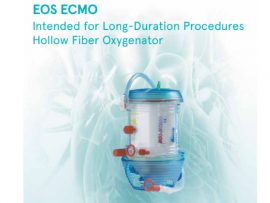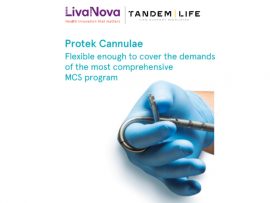Introduction Extracorporeal membrane oxygenation (ECMO) is increasingly used for circulatory or pulmonary support not only in-hospital but also out-of-hospital. Small dimensions and a lightweight design are important, especially for out-of-hospital..
Lee masAbstract Cardiogenic shock (CS) is a complex and life‐threatening condition characterized by a sudden and profound reduction in cardiac output, leading to inadequate tissue perfusion and oxygen delivery and organ..
Lee masAbstract National trends show rapid increases in the use of mechanical circulatory support devices (MCSD) over the last 20 years. While current literature has not proven a mortality benefit in..
Lee masAbstract Purpose: Venoarterial extracorporeal membrane oxygenation (V-A ECMO) can be used to support severely ill patients with cardiogenic shock. While age is commonly used in patient selection, little is known..
Lee masAbstract Left ventricular (LV) unloading has been shown to improve survival for patients requiring veno-arterial extracorporeal membrane oxygenation (VA ECMO) support for cardiogenic shock. A mortality benefit has been shown..
Lee masAbstract Background There is considerable debate about the hemodynamic effects of veno-arterial extracorporeal membrane oxygenation (VA-ECMO). Aims To evaluate the changes in left ventricular (LV) function, volumes, and work in..
Lee masAbstract Topic The growing use of acute mechanical circulatory support devices to provide hemodynamic support that has accompanied the increasing prevalence of heart failure and cardiogenic shock, despite significant improvement..
Lee masAbstract Background Venoarterial extracorporeal membrane oxygenation (ECMO) provides full hemodynamic support for patients with cardiogenic shock, but optimal timing of ECMO initiation remains uncertain. We sought to determine whether earlier..
Lee masAbstract Peripheral venoarterial extracorporeal membrane oxygenation (VA-ECMO) is increasingly being used in patients suffering from refractory cardiogenic shock (CS). Although considered life-saving, peripheral VA-ECMO may also be responsible for intracardiac..
Lee masAbstract Long-term neuropsychiatric symptoms as well as neurologic and functional impairment are common in patients who receive extracorporeal membrane oxygenation (ECMO) support, results of a new meta-analysis showed. More than..
Lee masAbstract Purpose: Cardiogenic shock is associated with high mortality. In refractory shock, it is unclear if mechanical circulatory support (MCS) devices improve survival. We conducted a network meta-analysis to determine..
Lee masAbstract Background The present article describes three cases of patients in cardiogenic shock (CS) with previous cardiac surgery that made them initially inoperable. Perioperative support with veno-arterial extracorporeal membrane oxygenation..
Lee masAbstract Introduction Critically ill patients supported with venoarterial (VA ECMO) are at risk of developing severe arterial , which has been associated with increased mortality. Lower saturation targets in this population may..
Lee masAbstract Cardiogenic shock is a complex and diverse pathological condition characterized by reduced myocardial contractility. The goal of treatment of cardiogenic shock is to improve abnormal hemodynamics and maintain adequate..
Lee masAbstract Introduction In children with myocarditis or dilated cardiomyopathy (DCM) on extracorporeal membrane oxygenation (ECMO) for cardiogenic shock, it is often necessary to decompress the left heart to minimize distension..
Lee masAbstract Background Veno-arterial Extracorporeal Membrane Oxygenation (VA-ECMO) is a rescue treatment in refractory cardiogenic shock (CS) or refractory cardiac arrest (CA). Exposure to hyperoxemia is common during VA-ECMO, and its..
Lee masAbstract Venoarterial extracorporeal membrane oxygenation (VA-ECMO) use for circulatory support in cardiogenic shock results in increased left ventricular (LV) afterload. The use of concomitant Impella or intra-aortic balloon pump (IABP)..
Lee masAbstract Despite extracorporeal membrane oxygenation (ECMO) utilization in nearly 20% of cases, there are limited data in children with acute fulminant myocarditis (AFM) requiring ECMO. Herein we identify risk factors..
Lee masAbstract Venoarterial extracorporeal membrane oxygenation (VA-ECMO) initiation for patients with cardiogenic shock or cardiac arrest is an attractive strategy since it provides a quick restoration of organ perfusion. One major..
Lee masAbstract Cardiogenic shock (CS) and cardiac arrest (CA) are among the most lethal complications of acute cardiovascular disease, affected by high in-hospital mortality rates. Venoarterial extracorporeal life support (VA ECLS)..
Lee masAbstract The development of mechanical circulatory support (MCS) has been rapid, and its use worldwide in patients with cardiogenic shock is increasingly widespread. However, current statistical data and clinical research..
Lee masAbstract Objective The authors performed a systematic review to evaluate the effect of pharmacologic therapy on pulmonary hypertension in the perioperative setting of elective cardiac surgery (PROSPERO CRD42023321041). Design Systematic..
Lee masAbstract Venoarterial extracorporeal membrane oxygenation (VA-ECMO) exposes the patient to infectious complications related to the cannulas or the site of insertion. The aim of the current study was to investigate..
Lee masAbstract Background: Cardiogenic shock is associated with high mortality. In refractory shock, it is unclear if mechanical circulatory support (MCS) devices improve survival. We conducted a systematic review and network meta-analysis..
Lee masAbstract Summary The importance of temporary mechanical circulatory support for treating acute heart failure with cardiogenic shock is increasingly recognized, and Impella (Abiomed, Danvers, MA, USA) has received particular attention..
Lee masAbstract Mechanical circulatory support for cardiogenic shock complicated by acute severe aortic regurgitation poses a unique challenge for traditional veno arterial extracorporeal membrane oxygenation (ECMO) because of rapidly rising left..
Lee masAbstract Background: Although extracorporeal membrane oxygenation (ECMO) is an integral part of a robust cardiogenic shock program, it is associated with high mortality. The optimal strategy for weaning from ECMO is..
Lee masAbstract Beside the tremendous developments in cardiac surgical procedures, the use of cardiopulmonary bypass (CPB) remains the gold standard to perform cardiac surgery but is associated with detrimental effects (e.g...
Lee masAbstract Introduction: In cardiogenic shock, peripheral veno-arterial extracorporeal membrane oxygenation (VA-ECMO) can provide hemodynamic support, however this results in adverse left ventricular afterload. Left ventricle (LV) venting (unloading) has favorable effects..
Lee masAbstract Complexity and a certain level of uncertainty are inherent to the clinical scenarios faced by the treating teams, often inundated with exhaustive details. Disease arises from a multitude of..
Lee mas












